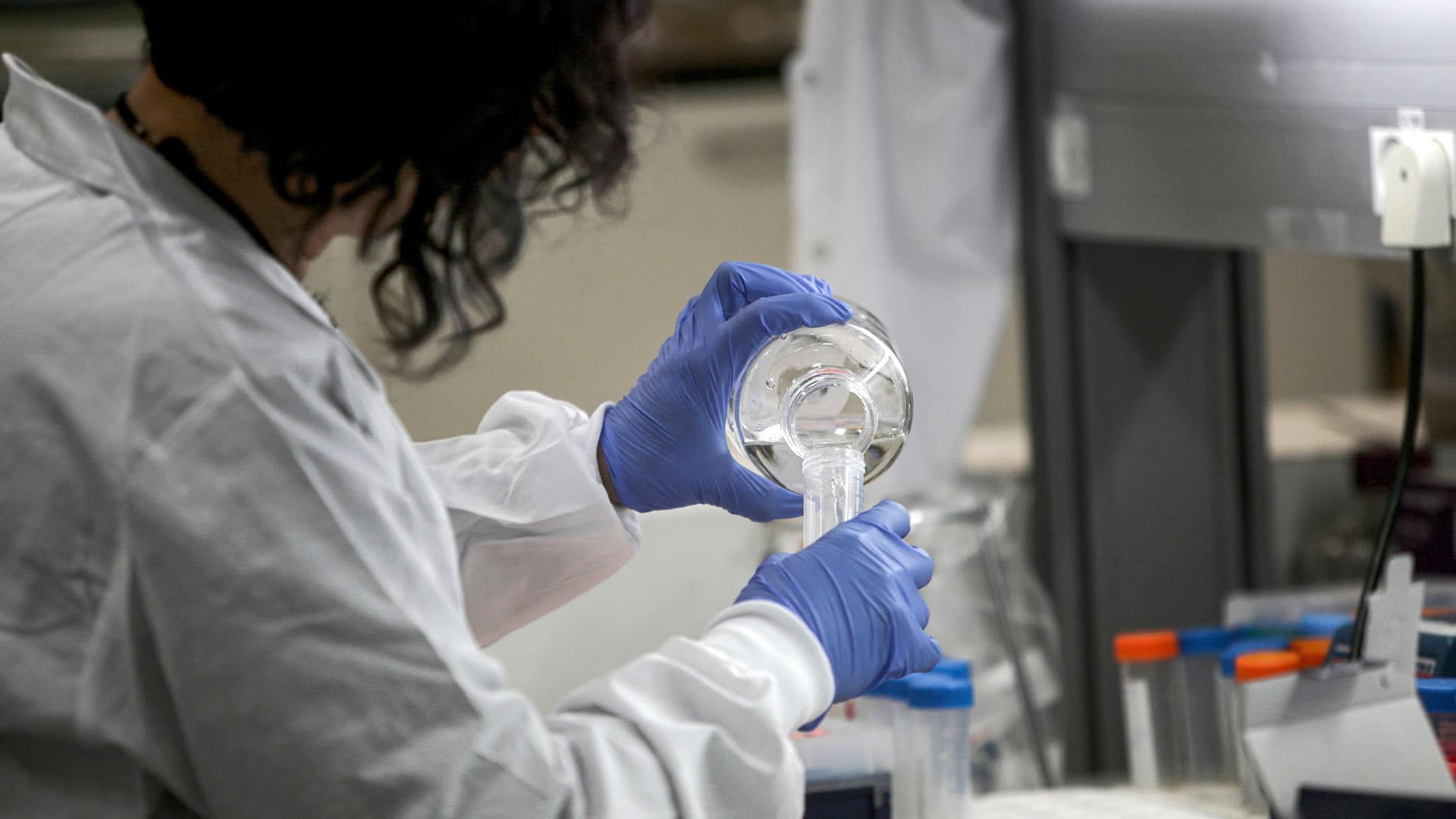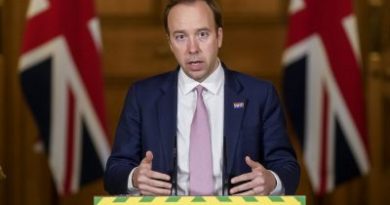How the Anti-Vaccine Community Is Responding to Covid-19

In early March, Melissa Floyd, a self-described health freedom educator who co-hosts “The Vaccine Conversation” podcast, was forced to abruptly change plans. She and her co-host were supposed to pack up for a live multi-city tour. But the public health crisis borne from Covid-19 delayed the start of their tour for months.
Floyd and her co-host, Bob Sears, a California-based pediatrician who advocates a delayed vaccine schedule and skipping some vaccines, addressed the cancellation in a podcast episode, noting that they don’t have any personal fear of the virus. Our government agencies, Floyd said, “are talking about washing your hands, but why aren’t they talking about things you can do to boost your immune system like vitamin D? Why aren’t they talking about reducing sugar? Why aren’t they talking about eating fruits and vegetables and staying away from processed foods?
“I’ve not heard any footage,” Floyd continued, “that talks about how to make your body strong — it’s just wash your hands, use a mask and hopefully that vaccine will come out sooner rather than later.” (Floyd did not respond to an interview request from Undark.)
Views like Floyd’s and Sears’ are influential — “The Vaccine Conversation” podcast has reportedly been downloaded nearly 400,000 times in 92 countries — and have been making gains in recent years, which has likely contributed to disease outbreaks like measles and whooping cough. The beliefs and messaging vary: Health and medical freedom advocates tend to oppose any mandated medical intervention, while vaccine skeptics question the need for medical immunizations. Those who are anti-vaccine may oppose them entirely. Approaches to the Covid-19 public health crisis also vary, but so far, while some in the community are rethinking their views, many of the responses from major influencers continue to wear down a familiar path of conspiratorial thinking and government mistrust, says Dorit Reiss, a law professor at the University of California Hastings who studies the anti-vaccination movement.
Experts say the trend doesn’t show much promise for changing entrenched skeptics’ minds about vaccines, even in the face of a global pandemic that has already cost more than 138,000 lives. On March 31, the White House coronavirus task force projected that 100,000 to 240,000 may die in the United States alone — and that’s with efforts to curb the virus’s spread. Public health officials agree that a vaccine is the only endgame that would allow people to resume all normal activities without periods of restricted movement or gatherings.
“I’m seeing a very similar pattern that I see when outbreaks of measles happen,” says Karen Ernst, executive director of Voices for Vaccines, a parent-led organization that advocates for vaccines. “That there is a certain amount of denial, blame, and conspiratorial thinking.” Anti-vaccine sentiment also ties into identity as much as belief. “These are people who make this part of their self-identity: I’m a mother, I have a natural lifestyle, I refuse vaccines. It’s important to deny things in order for that identity to be protected.”
But now that the world is remembering the horrors of viral disease — more than 1.9 million people have been infected worldwide — public health experts see an opportunity to convince people who are on the fence about the benefits of vaccination. “It’s a moment of opportunity” for vaccine support, says Reiss, adding that there may be a strong desire for a vaccine when it does arrive.
To be anti-vaccine in today’s world, says Reiss, you have to subscribe to some conspiracy theories, because there is so much data on the other side. That’s not to say anything about peoples’ intelligence, she adds. “You can be very intelligent and very grounded and still believe in conspiracy theories.”
The first way that those who are against or hesistant about vaccination are responding to the newest health crisis is by denying that it even exists or by saying it’s not that bad and people are not actually dying, says Reiss. For example, last month Del Bigtree — producer of the documentary “Vaxxed” and host of the popular online show “The Highwire” — told his audience that China’s numbers didn’t add up.
“It’s not as deadly as we’ve been told,” he said, adding later in the show: “This is really only a tragic situation for a small group of people that are immune-suppressed or elderly.” Similarly, on March 28, Sears posted on Facebook: “Elderly are vulnerable and need protection AND Covid is harmless to almost everyone else.”
Both statements are incorrect — there are numerous reports of young, healthy people in intensive care and on ventilators. But it’s a common tactic, says Reiss. “They focus on death, and they ignore hospitalization, and they’re going to say: look, it’s not going to kill you, you shouldn’t get the vaccine,” she says. “They do that with other diseases as well.” A recent Washington Post analysis found that hundreds of people under the age of 50 have also died from the coronavirus.
Other popular anti-vaccine Covid-19 theories suggest technology is to blame. Keri Hilson, an American singer with 4.2 million Twitter followers, posted now-deleted tweets attempting to link the coronavirus to 5G mobile networks. “People have been trying to warn us about 5G for YEARS,” she wrote, adding that 5G launched in China in November of 2019, and then people started dying. Joshua Coleman, an anti-vaccine activist who claims a vaccine injury caused his son to need a wheelchair, claimed on Facebook that coronavirus is in fact caused by 5G. In the United Kingdom, authorities say the conspiracy theory has led to the damage of dozens of wireless towers and other telecommunications equipment.
Meanwhile, Larry Cook, an anti-vaccine influencer who runs the popular Facebook page “Stop Mandatory Vaccination,” has claimed — without evidence — on his personal page that lockdowns and social distancing are a way to make it easier for the government to track people and require them to be tested for the virus. That way, he has said, the government would mandate vaccinations for everyone. “This lockdown and ‘social distancing’ is psychological and economic warfare against us so we will accept mandatory vaccination,” he wrote on April 12.
(Cook did not respond to an interview request from Undark.)
Still other anti-vaccine advocates focus on ongoing efforts to create and test a Covid-19 vaccine. The Children’s Health Defense, a nonprofit founded by Robert F. Kennedy, Jr. that links conditions like autism and diabetes to vaccines, pesticides, and other exposures, said the rush to find a vaccine — instead of focusing on treatments — is a looming problem that is driven by profit. A blog post on the group’s website claims: “For the moment, our government is prioritizing vaccine development (with the enticing promise of lucrative patents) over existing therapeutics (such as vitamin C and already-FDA-approved drugs) that do not offer comparable financial windfalls.” The post goes on to claim, without citing evidence, that “fast-tracked vaccines are a sweetheart deal for both biopharma and government.”
Of course, even with Covid-19 treatments — which have not yet been rigorously studied — many health experts agree that life is never going to be normal without a vaccine, including former FDA commissioner Scott Gottlieb and White House infectious disease adviser Anthony Fauci.
And another common thread in anti-vaccine groups focuses on the belief that natural immunity — the kind you get from actually having a disease — is better than immunity from a vaccine. The logic, they argue, is that if natural disease is a healthy and normal process, people should just go ahead and get infected with a disease, which will eventually give them immunity and protect more people. “It’s an inferior immunity that vaccines provide, which is why we’ve seen second, third, fourth, fifth doses of vaccines, why everyone has to get a flu shot every single year,” Bigtree said on his March 26 show.
In an interview, Bigtree elaborated, saying he’s not anti-vaccine for the right people. “I would never have a problem with any product if it was designed for the people that need it,” he said. “I do not agree with the principle that perfectly healthy people need to take a product to protect a very small percentage of sick people.”
He added that he would probably not get the vaccine when it becomes available, and that he is willing to take certain calculated risks with his own family.
And it’s not just anti-vaccine groups promoting the idea that people should get sick. The Federalist, an American conservative online magazine, published a story on March 25 advocating a voluntary infection approach for Covid-19.
While it’s true that, in most cases, natural immunity can last longer than vaccine-induced immunity, public health experts say the risks of the former outweigh the risks of the latter for every recommended vaccine. Natural immunity, Ernst says, “protects people after a whole bunch of people get sick, and that’s not good.” Reiss adds that none of these denials or conspiracy theories are new — they’re classic beats in the anti-vaccination world: “They’ve been circulating around, but they’re just applying old beliefs to new contexts.” The new context matters, though — Covid-19 is a public health crisis on a level that hasn’t been seen in 100 years.
Despite the common anti-vaccination themes that are cropping up in the Covid-19 pandemic, there are some signs of change. According to the experts Undark interviewed, the current crisis could usher in an era of increased interest in vaccines — or at least in taking responsibility for the health of others. That would be a welcome trend for public health advocates. In 2019, a global survey from The Wellcome Group of people in more than 140 countries found 79 percent of respondents think vaccines are safe and effective. Still, those living in Western Europe reported the lowest confidence in vaccines, which potentially endangers herd immunity.
Catherine Flores Martin, executive director for the California Immunization Coalition, says she is seeing a shift in people reacting to anti-vaccine posts on social media. And she thinks people are going to be a lot less forgiving of anti-vaccination beliefs in the future. “There will still be the believers, but I think other people are going to be a lot less tolerant of it now that people have seen how disease can impact their life. We have their attention.”
Flores Martin also sees a shift in the way people talk about their personal and societal responsibilities: “It’s not just about social responsibility or environmental responsibility, but public health responsibility.”
Ernst worries about a different downstream effect of the current crisis: With social distancing guidelines in place, fewer parents may bring babies under two years old to receive routine vaccinations. “That’s related because at the downward slide of this pandemic, we don’t want to deal with measles outbreaks everywhere, or mumps on college campuses,” she says. “We don’t want meningitis at high schools. We don’t want to follow one crisis with a whole bunch of other preventable crises.”
The vaccine-skeptic communities haven’t ignored that possibility, either. On the “Your Baby, Your Way” Facebook page, a group that advocates a vaccine schedule that omits or delays routine vaccines, a post from March 27 extolled the virtues of skipping doctor’s visits.
“People in America are staying home because of Coronavirus,” the post read. “Even the most conventional parents are skipping some well-baby checks. You know what that means, right?! The less often you take a baby to ‘routine’ doctors’ appointments, the more likely you are to keep breastfeeding, avoid Tylenol, avoid antibiotics, and delay vaccines.”
“Here’s to hoping every parent of a newborn, two-month-old, four-month-old, and six-month-old decides to SKIP the well-baby visits that are making so many of our babies sick,” the post concluded.
Jennifer Margulis, who authored the “Your Baby, Your Way” book and is one of nine moderators the corresponding Facebook page, which has more than 40,000 followers, said that the page’s followers are worried about coronavirus — but they are equally concerned that the vaccines in development are being rushed to market without safety testing.
“Experts are saying that it will [be] very difficult to develop a safe vaccine against a respiratory illness like Covid-19,” she told Undark in an email. “An effective vaccine against SARS was never successfully implemented.” (A SARS vaccine was developed in the early 2000s, but never brought to market as public health measures curbed the disease before it was ready.) Margulis also pointed to a dengue vaccine rolled out in the Philippines that has been shown to pose a risk of severe illness in people who have not been previously infected. Public health officials have since implemented restrictions and issued additional caution on the use of the vaccine.
William Schaffner, medical director of the National Foundation for Infectious Diseases and a professor of preventative medicine at Vanderbilt University sees a relevant historical lesson. During the run-up to the Iraq War, the government touted a smallpox vaccine. Smallpox had been eradicated globally in 1980, but Saddam Hussein had allegedly retained a small supply and military leaders warned that he may use it against Americans. The vaccine never would be licensed today, Schaffner says, because it was linked to so many adverse events. “But the anti-vax movement was totally silent when that vaccine came out,” he adds. “The reason they were silent was evident — they were smart. Politically, it would be damaging to them if they had gone against something that the President of the U.S. was in favor of, so they just kept quiet.”
“I suspect that if coronavirus continues to be a public health problem and if we get a vaccine, and if the leadership of this country defines it as a public health problem, and the nation’s focus is on getting as many people vaccinated as possible, my prediction is they will keep themselves very quiet about that. They will not come out against it,” he adds. “They are very media-savvy.”
*** This article has been archived for your research. The original version from Undark Magazine can be found here ***


